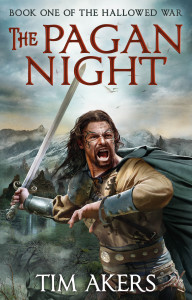I’m going to engage in a little nostalgia this morning. This is part of an object lesson, about what can be achieved with persistent effort. It relates to last week’s post on discipline.
New writers sometimes complain that they don’t have the necessary talent, that so-and-so was just born a better writer. And there’s a little truth to that. Some people are more naturally talented than others. One of my childhood friends was simply a good drawer. He never learned the thing about the face triangle or how to balance the proportions of the body or any of that. He just sat down and drew what he saw, and it looked right. But just because you don’t have a talent for something doesn’t mean you can’t get good at it. Allow me to demonstrate.
I love miniatures. I use them in RPGs, in wargames, sometimes I just buy them to paint, because I think they look cool. But I have no natural talent for the task of painting these tiny little things. I just decided, almost thirty years ago, that this was something that I was going to do, no matter how badly it went. Behold.
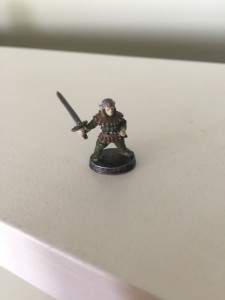
That’s the first miniature I ever painted. I had a little experience with 1:35 scale military modeling, but I knew nothing of the fundamentals of miniatures. Still, I did an okay job, I think. The rivets on his armor are silver, the borders between flesh and clothing and beard and steel are well defined. So I guess maybe I had a little talent. But nothing great. This was in high school, and I remember thinking “Hey, this cost me a couple bucks and kept me interested for the whole day. I could really get into this.
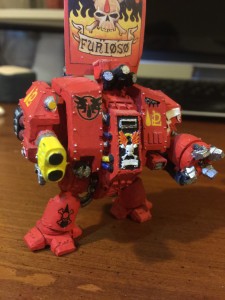
This is probably four years later. There are a lot of space marines between now and then, but I wasn’t making great leaps in the skill department. I was neat, and that’s about it. I chose this model to show because it’s both neat and detailed, but there’s no highlighting, no shading, none of the stuff that marks improvement. I spend a lot of time on this model. It was expensive at a time when I didn’t have money to push around, and I really gave it my all. Again, good detailing. The borders are occasionally soft and blotty, but overall I was proud of that model.
Funny story: I never played Blood Angels. I was Space Wolves all the way, baby.
After I got married I took a break, because I really, really didn’t have the money, nor the time, to devote to any of my hobbies. Some years later I picked it up again and, after some brushing up of the old skill set, produced this:
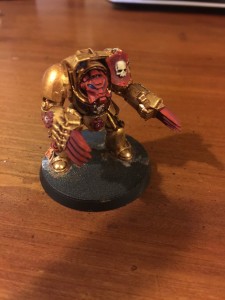
It’s hard to pick out in the pic, but I’m starting to highlight. I had developed a love for inks, too, so there’s an interesting shadow mix on that metallic. I even highlighted the eyes! I’ve become aware of more advanced techniques and am trying the out. This is around the time I started writing professionally. Again I got busy, but this time I kept painting. And that stretch of practice brought this.
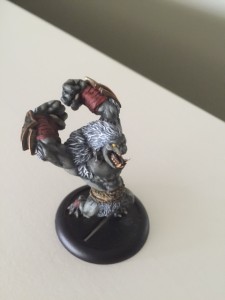
I’m very happy with this model. There are maybe five levels of highlights on the muscles, the hair took base, shadow, highlight and final highlights, I’ve really got some nice ink work on the greaves and bindings. I really feel like this is a serious improvement in my skill.
It only took twenty-five years. And there was a lot of stopping and starting in there, and I’ve never had a second of guidance. This is just me sitting in a room and trying things with paint to see how it works. And I still have a lot of room for improvement. I’m not sure how much better I’ll get. To be honest, my eyes are starting to betray me. I’m already painting with reading glasses on, and I’m not sure I’ll ever be able to see the finer details as well as I could in college. But that just means I’m less aware of my mistakes, so it’s all win, all the time.
One other thing: none of those models are properly based. I’ve never based a single model. I’m not sure that I will. I don’t even know where to begin on that.
How does this relate to writing? Simple. Work hard, and improve over time. Get frustrated with what you do wrong, but rest easy in the knowledge that recognizing failure is the first step to success. Becoming aware of advanced techniques, whether that means inking, highlighting, two-brush blending or dialogue, pacing, narrative description, just the act of seeing that in other people’s work and thinking about how it might apply to your own creations, that’s an improvement. There may be techniques that you’ll manage just naturally. I’ve always been a neat painter. I’ve always been good at description. But that doesn’t mean you can rely on that one technique to create your masterpiece. Depend on it, but learn the related skills.
Work hard every day. Get better with every failure. Play the long game.

